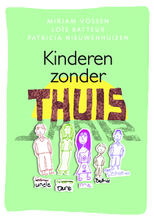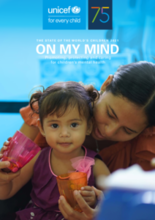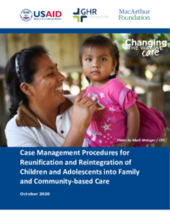Demographic Data
|
Sources: World Bank, UNICEF,UNDP HDR 2015, DHS 2014 |
Displaying 2241 - 2250 of 14348
This short paper examines why children on the move need to be included in care reform in the region, how the care needs of these boys and girls can be met, and what lessons can be learned from the care of children on the move to inform the care of children more broadly.
The current article investigated the financial impact of transitioning to a family-based model of care, donor engagement practices used in this process, and changes in donor support resulting from the transition.
Miljoenen kinderen in ontwikkelingslanden kunnen tijdelijk of langdurig niet thuis wonen. Soms omdat hun ouders zijn overleden of omdat de problemen thuis te groot zijn. Soms omdat ze zijn weggelopen of van hun familie gescheiden door oorlogen, rampen of kinderhandelaren. Het lot van deze kwetsbare kinderen gaat veel mensen aan het hart. Ze starten een project, doen vrijwilligerswerk met kinderen of ondersteunen een weeshuis.
Voor hen is Kinderen zonder ‘thuis’ bedoeld.
This policy brief summarizes the key findings and recommendations from the International Review of Parent Advocacy in Child Welfare in low, middle and high-income countries, and identifies elements of a strategy to strengthen children’s care and protection through parent participation.
The State of the World’s Children 2021 calls for commitment, communication and action to promote good mental health for every child, protect vulnerable children and care for children facing the greatest challenges.
The analysis presented in this report looks at historical trends in child marriage, with a focus on selected countries that have recorded significant declines in child marriage prevalence. It offers an overview of changes in the practice together with a review of other shifts that have occurred in these countries in terms of girls’ access to education and employment opportunities, as well as economic development and poverty reduction.
This Handbook is a summarized, simplified version of the Case Worker’s Guidebook for Case Management for Reintegration of Children/Young Adults into Family- or Community-Based Care. It provides an overview of the principles and practices of case management for reunification and placement of children/young adults outside of parental care (e.g., street-connected children/young adults or from Charitable Children’s Institutions and Statutory Children’s Institutions) into family- and community-based care, up until sustainable reintegration is achieved. The Handbook aims to provide an easy and quick reference to critical information and “how to” about case management for reintegration.
Case Management Procedures for Reunification and Reintegration of Children and Adolescents into Family and Community-based Care was developed together with Secretary of Social Welfare (SBS), the Office of the Child and Youth Advocate (PNA), Guatemala’s Attorney General (PGN), the Judicial Branch (OJ), the National Council of Adoptions (CNA), ASOCRIGUA and Hogar Aldeas de Esperanza. It was informed by Changing the Way We Care’s work in Kenya on the Caseworker’s Guidebook: Case Management for Reintegration of Children into Family or Community-Based Care, adapted to the Guatemalan context.
Several UN agencies issued a joint statement calling for greater protection and a comprehensive regional approach for Haitians on the move, including accompanied and unaccompanied and separated children.
Canada’s first National Day for Truth and Reconciliation will be held on September 30th, 2021.







